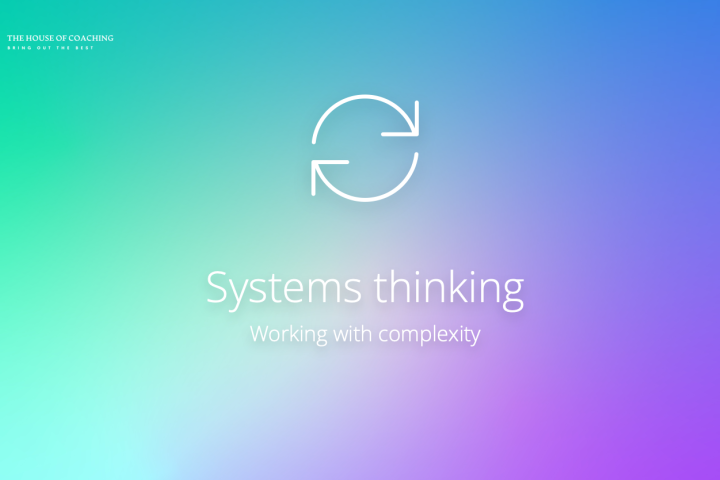Systems Thinking
Systems theory offers a highly effective framework for dealing with complexity. The principles and working methods help to change a culture in depth from a hierarchical 'silo' thinking to an integrative mindset that views problems as phenomena resulting from underlying systemic interactions and limiting or enabling mindsets.
Learning objectives:
We present a series of eight (online / live / hybrid) training sessions. Unlike a mere 'theoretical' approach, the ubeon programme is entirely focused on the actual challenges and work situation the participants face on a daily basis. In this way, the systemic toolbox becomes highly relevant and participants will experience first-hand the impact they can bring about by putting systemic principles and techniques into practice.
The learning programme integrates 'hard systems' (organisation, processes, structure, finance, etc.) with 'soft systems' (mindset, drives, energy, culture, behaviour, etc.).
This is a programme that challenges people. They learn to deal flexibly with different perceptions and conflicting beliefs. They become aware about classic thinking errors and how these lead to limiting archetypal patterns. People immediately start using the systemic tools and discover for themselves the difference they can make with them.
Programme:
Systems thinking is a scientific discipline. However, the focus of this supportive training is not on the academic but on the practical applications of systemic principles and techniques. These are developed in a series of workshops.
- General framework (1 half-day session)
During this workshop, participants will learn the general principles of systems thinking.
- Distinguishing between phenomena, behaviour, systems and mental models using the iceberg model;
- Distinguish between mechanistic and integrative approaches;
- Distinguishing between linearity and complexity using Cynefin;
- Techniques for switching between analysis & synthesis;
- Quality of perception (1 half-day workshop)
Tijdens deze workshop leren de deelnemers hoe ze aan de slag kunnen gaan met divergerende percepties en de kwaliteit van de (gemeenschappelijke) perceptie te verhogen.
- Distinguishing between reality and meaning;
- Recognising common thinking errors;
- Conversation techniques to identify and rectify thinking errors;
- Transforming resistance into understanding, commitment and cooperation;
- Mapping causality (1 half-day workshop)
During this workshop, participants will learn how to identify and map cause-and-effect relationships.
- Recognising Causality;
- Causal relationships vs correlations;
- Causal Loop Diagram (CLD) mapping:
- Identifying variables
- Identifying causal relationships
- Mapping feedback loops;
- Mapping delays;
- Identifying limits;
- CLD facilitation techniques to overcome thinking errors;
- Archetypes I (1 half-day workshop)
During this workshop, participants learn the simple systemic archetypes. For each archetype, we explore which mindset leads to a particular pattern and how to accommodate it.
- Balancing process with delay
- Limits to growth
- Shifting the burden
- Eroding goals
- Archetypes II (1 half day)
Tijdens deze workshop leren de deelnemers complexere systemische archetypes. Bij elk archetype onderzoeken we welke mindset tot een bepaald patroon leiden en hoe we die kunnen opvangen.
- Escalation
- Fixes that fail
- Success to the successful
- Archetypes III (1 dagdeel)
Tijdens deze workshop leren de deelnemers complexere systemische archetypes. Bij elk archetype onderzoeken we welke mindset tot een bepaald patroon leiden en hoe we die kunnen opvangen.
- Tragedy of the commons
- Growth & underinvestment
- Interactions between systemic archetypes
- Facilitating strategy development with systems thinking (1 half-day workshop)
During this workshop, participants learn to use systemic techniques in conversations, meetings and workshops.
- Recognise thinking errors and limiting beliefs;
- Dealing with opposing beliefs, resistance, ...;
- Reframing techniques (rethinking);
- Working forms for facilitating strategic and generative dialogue;
- Scenario thinking and storytelling (1 half-day workshop)
During this workshop, participants learn how to develop various scenarios based on systemic principles and techniques and learn to use powerful positive attractors to move dynamics in systems in desired directions.
- Using scenario thinking as a strategic working tool;
- Various storytelling techniques to create powerful positive attractors;
- How to channel energy in the field towards desired outcomes;
Experiential Learning at The House of Coaching
The House of Coaching stands for experiential learning. As a participant, you continuously engage with theory through practical, experiential exercises that teach you to apply your skills in real situations. We facilitate the learning process through maximum interaction and sharing of experiences. That's learning that really sticks!

Would you like to develop these 21st Century Skills for your people, team or organisation?
Then get in touch with us and we'll work out a programme together!
| Program category | |
|---|---|
| Program type | |
| Program languages | |
| Number of modules |
8
|
| Number of participants |
6 - 12
|